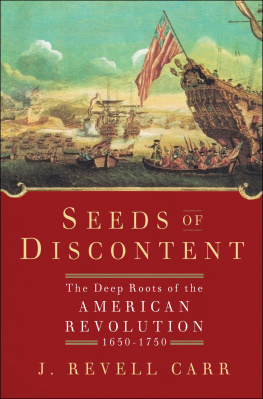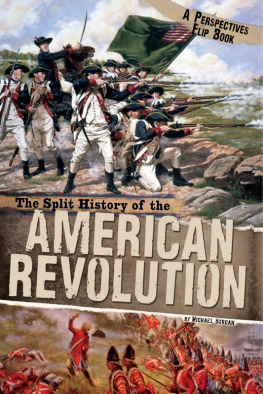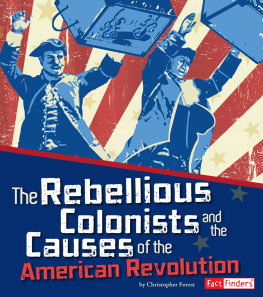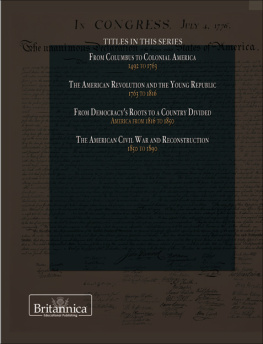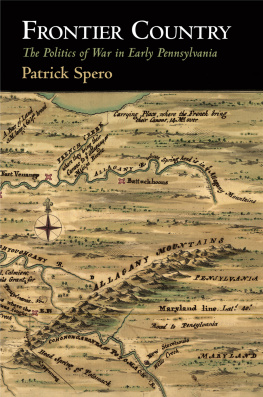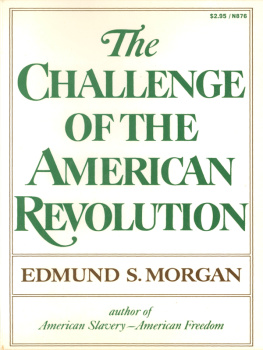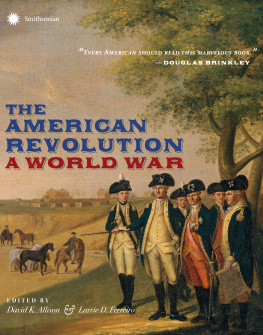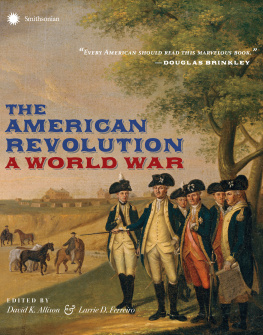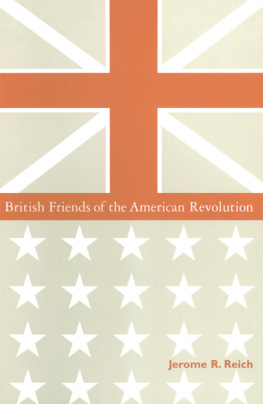PAST AND
PROLOGUE
PAST AND
PROLOGUE

POLITICS AND MEMORY IN
THE AMERICAN REVOLUTION
Michael D. Hattem

Published with assistance from the Annie Burr Lewis Fund.
Published with assistance from the Mary Cady Tew Memorial Fund.
Copyright 2020 by Michael D. Hattem.
All rights reserved.
This book may not be reproduced, in whole or in part, including illustrations, in any form (beyond that copying permitted by Sections 107 and 108 of the U.S. Copyright Law and except by reviewers for the public press), without written permission from the publishers.
Yale University Press books may be purchased in quantity for educational, business, or promotional use. For information, please e-mail (U.K. office).
Designed by
Set in type by
Printed in the United States of America.
Library of Congress Control Number: 2020935118
ISBN 978-0-300-23496-1 (hardcover : alk. paper)
A catalogue record for this book is available from the British Library.
This paper meets the requirements of ANSI/NISO Z39.48-1992
(Permanence of Paper).
10 9 8 7 6 5 4 3 2 1
For Lucien, Tristan, and Lorelei,
and my parents, Sharon and Robert
CONTENTS

PART I
COLONIAL HISTORY CULTURE IN BRITISH AMERICA, 17301776
CHAPTER ONE
History Culture in Pre-Revolutionary British America
CHAPTER TWO
The Colonial Past in the Imperial Crisis
CHAPTER THREE
The British Past in the Imperial Crisis
Interlude
Natural Law, Independence, and Revolutionary History Culture, 17721776
PART II
NATIONAL HISTORY CULTURE IN THE EARLY REPUBLIC, 17761812
CHAPTER FOUR
The Expansion of Early National History Culture
CHAPTER FIVE
The Colonial Past in the Early Republic
CHAPTER SIX
Creating a Deep Past for a New Nation
ACKNOWLEDGMENTS

Though the cover of this book suggests that I am the sole author, it could not have been written but for the indispensable contributions, support, and encouragement of many. First, I would like to thank my wife, Veronica, my two sons, Lucien and Tristan, and my daughter, Lorelei. My brothers, Sam, Dave, and Rich lent me more support and encouragement than any one person deserves, as did my mother who passed away in 1994 and my father who passed away a few months shy of the completion of the dissertation on which this book is based. I must also thank my graduate advisor, Joanne Freeman, who was willing to take a chance on a thirty-six-year-old graduate of the City College of New York. Along the way, she has repeatedly gone far above and beyond the advisors call of duty, thereby teaching me a great deal about mentorship and professionalism. The opportunity to pay that forward is a real privilege. For her astute and timely guidance and wisdom and her unfailing support and friendship, I am forever grateful and eternally indebted. In addition, I would like to thank my other dissertation committee members: Steve Pincus, whose early and continued interest in and support for both this work and my career has been critically important and whose unmatched intellectual rigor as a historian will serve as a model for the rest of my life; and Benjamin H. Irvin, who early on helped broaden my perspective temporally, geographically, and thematically and later offered important, informed, and very timely professional advice and support.
I would also like to take this opportunity to acknowledge the immense impact that my undergraduate advisorsthe late (and sorely missed) Edwin G. Burrows, Darren Staloff, and Carol Berkinhad (and continue to have) on both my professional and personal development. This book is the direct product of the encouragement they showed to a thirty-something community college student who had never graduated from high school yet had nevertheless developed an obscene obsession with early America and early American historiography. As a community-college student taking their classes at senior CUNY schools, it was a revelatory experience for me to talk with and be taken seriously by such eminent historians. Their support for me, from our first meetings to the present, has been unceasing and from them I have learned a great deal about what it means to be a good historian, scholar, teacher, and colleague. I should also acknowledge my gratitude to my professors and fellow students at the City College of New York, especially Gregory P. Downs, Joshua Clough, Will Hickox, and Fidel Tavarez. I would also like to thank everyone at the CUNY Baccalaureate for Interdisciplinary Studiesparticularly Kim Hartswick, Rafal Szczurowski, Beth Kneller, Kate McPherson, and Jean Myersfor being especially supportive of me and for the amazing work they do in managing one of the best undergraduate programs in the country. I must also thank Jacob Kramer for giving me my first opportunity to do a research project at the Borough of Manhattan Community College, where I began this academic journey over ten years ago with only a dusty, fifteen-year-old GED.
Like the early national historians whom I write about in chapter 4, I, too, have been fortunate to be part of a supportive network of fellow historians. From the early American community at Yale University while I was a graduate student, I must thank Michael Blaakman, the contemporary epitome of a scholar and a gentleman, as well as Zachary Conn, Alejandra Dubcovsky, Catherine Treesh, Emily Yankowitz, and the rest of the small but active Yale early American community. I count myself incredibly fortunate to call them friends and colleagues. My fellow members of The Junto: A Group Blog on Early American History have also been invaluable to me as both colleagues and friends. In particular, I must thank my fellow hosts of The JuntoCast: A Podcast on Early American History, Ken Owen and Roy Rogers. Ken has been a constant presence who offers both great historical insight and professional advice, and I am a better historian (and academic) thanks to his friendship over the last eight years. Roy, too, was an invaluable colleague and friend who, on more than one occasion, helped me keep both the past and present in perspective. I am especially grateful to those who were generous enough to offer feedback on the obscenely lengthy first drafts of chapters, including Mark Boonshoft, who tolerates far more of my online ranting (both about history and music) than he should, and Christopher F. Minty, who read more of and offered more crucial feedback on the dissertation this book came from than anyone outside of my committee, especially in its rough, early stages. Greg Brooking also offered valuable feedback on the prologue at a very inconvenient time for him, for which I am greatly appreciative. All three have been invaluable as periodic sounding boards. I am also grateful to the generous scholars at the CUNY Early American Republic Seminarincluding John Blanton, Nora Slonimsky, Michael Crowder, and Laura Pingfor offering valuable feedback on a seminar paper based on my dissertation prospectus, inviting me to give my first presentation of this research at their 2015 conference. When workshopping my last chapter prior to final revisions there, I received important feedback and suggestions from David Waldstreicher, Michael Crowder, and Evan Turiano, for which I am highly grateful.
Next page

